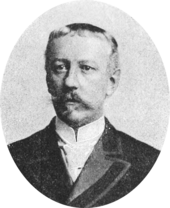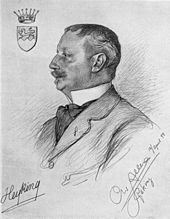Edmund Friedrich Gustav von Heyking
Edmund Friedrich Gustav von Heyking (born March 16, 1850 in Mitka, Courland , † June 15, 1915 in Berlin ) was a German diplomat .
Life
His parents were Amalie Auguste, née von Jacobs and Friedrich Alfred Baron Heyking , who had been authorized representative of Courland since 1859 . Von Heyking studied law and economics at the Ruprecht-Karls-Universität Heidelberg .
In 1874 Alexander II hired him as a ministerial official in Saint Petersburg and in 1876 sent him to Philadelphia . In 1878 he took over the editor-in-chief of the German-language newspaper for town and country in Riga along with the Baltic monthly magazines . In 1881 he received his doctorate in Berlin. In the same year Herbert von Bismarck found him a job in the Reich Office of the Interior . In 1884 he married Elisabeth von Flemming .
From July 1886 to February 1889 von Heyking worked in Valparaíso , then until April 1893 in Calcutta . This was followed by a vacation until February 1894 and then until April 1896 a phase in Cairo . Until June 1899, von Heyking was an envoy in Beijing . After a vacation in Germany, she worked in Mexico . In February 1903, von Heyking started his journey home to Europe.
During his stays abroad, Edmund von Heyking had his wife Elisabeth von Heyking with him, while their two sons and Elisabeth von Heyking's daughter from their first marriage mostly stayed in Germany.
In 1907 Edmund von Heyking was retired due to illness. He then lived at Crossen Castle until his death .
Heyking and the fight for Kiautschou
The posting of Heykings as envoy of the German Reich in Beijing was an accompanying measure for the occupation of a place as a naval base in China. In September 1896, Alfred von Tirpitz proposed the Bay of Kiautschou as a naval base for the German Navy. Heykings also favored the Bay of Kiautschou as a location and suggested using an incident involving German missionaries or instructors as a pretext for an occupation.
In a letter dated March 15, 1897 to Chlodwig zu Hohenlohe-Schillingsfürst , von Heyking advised the establishment of a reptile fund , with which the German consul in Canton Wilhelm Knappe wanted to pay a network of informers for 30 Shanghai dollars a month from March 1, 1897.
Works
- Travel pictures from European Russia and the Caucasus , Leipzig 1878 ( digitized from the holdings of the Leibniz Institute for East and Southeast European Research ).
literature
- Carola L. Gottzmann , Petra Hörner: Lexicon of the German-language literature of the Baltic States and St. Petersburg . De Gruyter, Berlin 2007, ISBN 978-3-11-019338-1 , p. 576 .
Web links
- Baltic Historical Commission (ed.): Entry on Edmund Friedrich Gustav von Heyking. In: BBLD - Baltic Biographical Lexicon digital
Individual evidence
- ^ Edmund Friedrich Gustav Freiherr von Heyking (1850–1915).
- ^ Elisabeth von Heyking: Diaries from four parts of the world. 1896/1904. Leipzig 1925
- ↑ Klaus Mühlhahn: Rule and Resistance in the "Model Colony" Kiautschou. Interactions between China and Germany, 1897–1914. Oldenbourg, Munich 2000, ISBN 3-486-56465-X , p. 91 ( digitized version )
- ↑ Nicola Spakowski, Cecilia Milwertz (Ed.): Women and gender in Chinese studies. Lit, Berlin 2006, ISBN 3-8258-9304-9 , p. 102 ( digitized version )
| personal data | |
|---|---|
| SURNAME | Heyking, Edmund Friedrich Gustav von |
| BRIEF DESCRIPTION | German diplomat |
| DATE OF BIRTH | March 16, 1850 |
| PLACE OF BIRTH | Riga |
| DATE OF DEATH | June 15, 1915 |
| Place of death | Crossen Castle |

